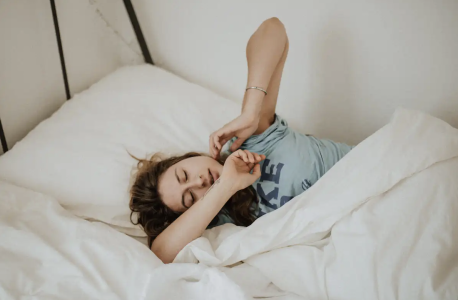SDC Rewards Member
Upgrade yours now
Does it matter what time I go to bed?
Some of us love to be tucked up in bed by a particular time every night, ensuring a certain number of hours of sleep. Others go to bed when they start to feel tired, or when they’ve finally finished everything they wanted to get done, and get up when they need to in the morning.
But does it matter what time you go to bed?
Why prioritise sleep?
Getting a good night’s sleep can improve brain function, mood, metabolic health and immunity.Not getting enough sleep or having poor sleep quality increases the risk of infections and other health problems such as depression, dementia, weight gain, diabetes and high blood pressure.
Recent studies even suggest not getting enough sleep at night can also increase the risk of developing long COVID.
Perhaps surprisingly, sleeping for seven to eight hours is associated with better health outcomes than shorter or longer sleeps.
How does our body clock work?
The timing of our sleep is orchestrated by the so-called “circadian clock”, the body’s internal biological timekeeper. It helps regulate many processes on a daily basis including the timing of our sleep-wake cycle.During evolution, living species – from bacteria and plants to humans – have acquired a circadian clock to optimise bodily processes in an environment that changes throughout the day. Consequently, almost all aspects of behaviour, physiology and metabolism are rhythmically organised to anticipate these daily changes.

Our circadian clock regulates when we sleep and wake. Unsplash/Nicolas Flor, CC BY
While we are, in theory, able to sleep at any time during the day as long we’re sufficiently tired, our circadian clock dictates us to be “diurnal”, meaning we’re active during the day and sleep during the night.
Working against this default stage – by doing shift work, where we work regular shifts at night or alternate between shifts, or staying up longer/waking up later over the weekend – can result in poorer health because it disconnects our physiology and behaviour from our internal circadian clock that is supposed to organise it.
Even the apparently harmless weekend sleep-in after a late night increases the risk of obesity and mental health issues. Indeed, this regular shift in our sleeping schedule every weekend creates a so-called “social jetlag” that, to some extend, mimics the effect of shift work.
But do you like to get up early or late?
Our individual biological night (when our body thinks it’s night) may differ substantially from the actual environmental night (when it’s actually night time).But our modern society doesn’t really support going to bed late and waking up later in the day. It can be even considered a sign of poor self-discipline and laziness. We’re told “the early bird catches the worm”, or that early risers have an advantage over late risers and tend to be more productive and successful.

Our society doesn’t value waking up later in the day. Kinga Cichewicz/Unsplash
But our sleep preferences are not really a matter of choice: they are mainly driven by our genes and depend on our chronotype. The chronotype is the natural tendency of a person to sleep or be active at a certain time during the day according to their circadian rhythms.
While most of us already know the expression that people can be either larks (early types) or night owls (late types), these chronotypes are the two extremes on the spectrum. Most people are somewhere in the middle.
As our chronotype depends on individual differences in our circadian clock properties, it is not really possible to actively alter our chronotype.
However, it can change over a lifetime: children are larks, adolescents tend to be night owls, and after the age of 20 and as we increase in age, we become lark-like again.
The chronotype itself does not affect how much sleep we need, which is also mainly influenced by other factors and genetics.
Rather, our chronotype interacts with our social obligations such as school, work or family responsibilities, which can affect how much sleep we get. Later chronotypes may have a disadvantage due to the pace of modern life as their natural chronotype conflicts with the demands of their schedule.
Consequently, a late chronotype is often associated with poor cardiometabolic health (affecting your heart and blood vessels) and the higher risk of depression.

Adolescents tend to be night owls. Jesus Rodriguez/Unsplash
In this context, there is a growing call from scientists for schools to delay the start time for teenagers to ensure sufficient sleep and improve health outcomes and school performance.
So there is no simple answer to the question of when to go to bed. While a regular good night’s sleep with an average of seven to eight hours is important for general health and well-being, our optimal bedtime depends on our internal circadian clock and other factors including genetics that control how long we need to sleep.
This article was first published on The Conversation, and was written by Frederic Gachon, as Associate Professor, Physiology of Circadian Rhythms, Institute for Molecular Bioscience, The University of Queensland, and Meltem Weger, Postdoctoral Research Fellow, Institute for Molecular Bioscience, The University of Queensland.
Last edited by a moderator:





